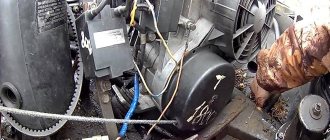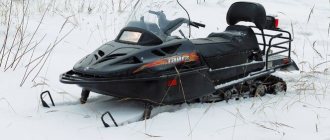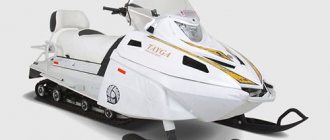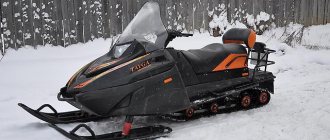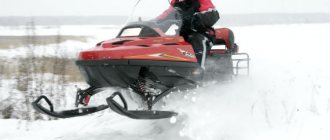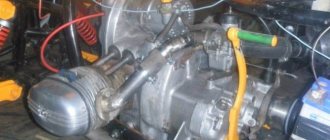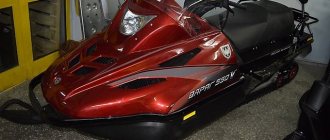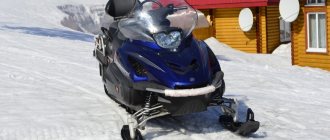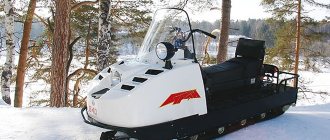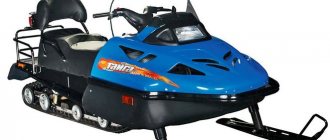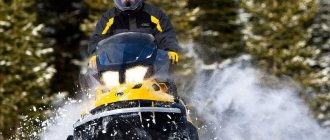All-terrain vehicles produced by Russian Mechanics OJSC are very popular among residents of the northern regions of not only Russia, but also other countries. Where winter recedes for a few short months, there is always a demand for such equipment. The Taiga line is considered the most successful among the company's products. It includes about a dozen models, each of which also has several design options. "Varyag" represents a multi-purpose Wide Track class vehicle with utilitarian properties.
The Taiga Varyag 550 snowmobile is distinguished by comfort and ergonomics, which were achieved thanks to a shift in the center of mass. In addition, the snowmobile has heated grips and a bright front headlight, which allows you to pilot special equipment in severe frosts and at night.
In addition, the model received a comfortable seat that will make even a long trip comfortable. “Varyag” is chosen not only by winter recreation enthusiasts, but also by residents of northern settlements for use for economic purposes.
Which plant produces the unit?
The Tayga snowmobile is considered one of the most successful lines produced by the Rybinsk Machine-Building Plant. The first prototype was released in 1988, but only ten years later, after a number of modifications, its production was put on the assembly line. Varyag 550 represents a budget type of motorcycle-type snowmobile equipment, adapted to the harsh conditions of our country.
In this model, design engineers combined comfort, ease of use and accessibility. First of all, the manufacturer was guided by the fact that the equipment would be used for economic purposes.
“Russian Mechanics” traces its history back to the times of the Soviet Union. Initially, the enterprise was part of Rybinsk Motors OJSC. It was from his assembly line that the first domestic snowmobile “Buran” rolled off, which at one time was a stunning success. The new enterprise is a full-fledged successor and continuer of the best traditions of Soviet mechanical engineering in the field of special equipment.
Currently located in the Yaroslavl region in the suburbs of Rybinsk. All-terrain vehicles that came off his assembly line are popular not only in Russia, but also in neighboring countries. All products of the plant undergo multi-level quality control and comply with European standards.
Alternative proposals from Russian Mechanics
The Rybinsk manufacturer not long ago released a junior version of the model in question called “Varyag 500 V”. Accordingly, the engine size was reduced, as was the power output. This version costs about 50-70 thousand rubles cheaper. It has a separate lubrication system, a simplified suspension and a short transmission stroke. Interesting snowmobiles from Russian Mechanics are also represented in the Bars line.” In particular, modification 850 can be considered, on the contrary, as an older snowmobile relative to the Varyag 500 V. This option is suitable just for those who want to get a real utilitarian snowmobile, and with a hint of touring performance.
User manual
The snowmobile operating manual contains detailed information on the location of the main control elements, indicators, and warning labels. The manual provides detailed instructions for starting the engine using an electric and manual starter, as well as stopping it. Documentation comes complete with the new all-terrain vehicle, but if necessary, it can be found on the Internet or downloaded from the manufacturer’s official website.
Maintenance
In order for any equipment to serve for a long time and always be in good condition, it must be maintained. The manual provides detailed descriptions of the stages of maintenance of the main components of the all-terrain vehicle:
- engine;
- carburetor;
- manual starter;
- chassis;
- transmissions;
- control elements;
- braking system.
A control inspection, checking fluid levels, and brake serviceability should be carried out every time before and after a trip. If complex operational problems occur, you should contact a specialized service center rather than trying to fix the problem yourself.
Types and frequency of maintenance
The first comprehensive maintenance of the vehicle must be carried out after running-in. Further, its frequency decreases:
| TO-1 | performed every 950-1050 kilometers |
| TO-2 | do after 3000-3050 kilometers |
| Seasonal | commissioning after long-term storage |
Break-in recommendations
How the equipment is used during the first time after purchase will determine its future performance. The duration of this period is from 250 to 350 kilometers.
In this case, the snowmobile owner must follow some recommendations:
- ride without passengers;
- choose areas with dense or compacted snow;
- do not drive on very rough terrain, wet and loose snow;
- observe the temperature regime from -25 to -3 degrees (higher temperatures increase the risk of engine overheating);
- do not allow the engine throttle to open completely;
- check the condition of fasteners;
- after 150 km, check the alignment and tension of the caterpillar tracks;
- Fill the tank with a mixture of fuel and engine oil in a ratio of 50:1.
It is also strictly not recommended to teach someone how to operate a new all-terrain vehicle during the break-in period. This can lead to unexpected overloads of the variator and power unit.
Maintenance Requirements
The main work involves cleaning the engine. It should be regularly removed from dirt and deposits. The condition of the cylinder-piston group and the quality of tightening of threaded connections are also checked. It is advisable to clean surfaces with hair brushes or scrapers without damaging the plastic consumables. Functional spare parts must have sufficient fastening reliability. The same snowmobile track is installed on the base with the optimal load level for the mounting force. Next, the electrical equipment, connections in the wiring contacts, as well as the operability of the devices are checked.
Specifications
The model comes in two main variations. The Taiga Varyag 550 V snowmobile has technical characteristics similar to the 550 V SE modification. There are some discrepancies in the configuration and individual parameters.
Engine
In accordance with the model labeling, the motor of its own production RMZ-550 is used as the main driving force. The two-stroke power unit is equipped with two cylinders. Two paired carburetors are used to power the fuel system.
Main engine parameters:
| Cylinder volume | 0.553 liters |
| Diameter | 7.6 cm |
| Piston stroke | 6.1 cm |
| Power | 55 horsepower |
| Carburetor type | float (Mikuni) |
| Cooling | air |
The Varyag engine, like any two-stroke engine, has a joint lubrication system. The exhaust system is equipped with a traditional muffler with a resonator.
Daniila Rukin
Snowmobile specialist "Buran". I go fishing in my free time.
Ask a Question
A reed valve is installed on the intake system, which reduces fuel consumption. As high pressure builds up in the crankcase, it pushes fuel back into the carburetor. The special valve design helps prevent this.
Dimensions and weight
The structural weight of this snowmobile is 280 kg for the 550 V model and 295 kg for the 550 V SE. The vehicle has a reinforced tow bar to which the cargo sled is attached. In this case, the maximum weight of the cargo can reach a quarter of a ton. This is more than enough to accommodate not only your gear, but also a large catch or loot.
Other dimensional characteristics (indicated in meters):
| Width | 1, 05 |
| Length (with skis) | 2,99 |
| Height (with windshield) | 1,42 |
Caterpillar
All variations of the Varyag 550 model are equipped with a Composit track mechanism, which acts as a propulsion mechanism. The drive sprockets are located at the front of the unit. The length of the track surface is 50.8 cm.
In this case, the mover has the following parameters:
| Length | 3.968 m |
| Width | 50 cm |
| Height of lugs | 3 cm |
The total height of the 550 V SE is 1.38 meters, while the track thickness is 2.2 cm.
Chassis
This all-terrain vehicle is based on a steel frame with a traditional pyramidal design. The front strut is equipped with two pneumatic shock absorbers.
Transmission
Both variations of the “Varyag” received a simplified automobile variator as a transmission, which is common for motorcycle-type vehicles.
The optionally installed transmission has two stages and four speeds:
- reduced;
- increased;
- reverse (reverse);
- neutral
Brake mechanism
Along with the transmission, a hydraulically controlled disc brake is installed on the chassis. However, the CE model received mechanical control.
Suspension
"Taiga 550" has a telescopic front and sliding rear suspension. In this case, the distance between the front skis reaches almost a meter (960 centimeters).
Other characteristics:
| Name of spare parts | Front/Rear | 550V | 550V SE |
| Suspension travel | front | 15 cm. | 15 cm. |
| rear | 38.5 cm. | 19 cm. | |
| Propulsion shock absorber | front | two-pipe hydropneumatic | absent |
| rear | single-pipe hydropneumatic | single-pipe hydropneumatic |
Both models have a shock-absorbing mono-tube front suspension system. It is also hydropneumatic type.
Electrical equipment
Like any other snowmobile of this class and price category, the Varyag 550 has a standard set of electronics. The following elements are installed on board from the factory:
- capacitive programmable ignition;
- electric starter (duplicated by manual start, lever nearby);
- halogen front headlight (with FF reflector) 55/60 power;
- heating system for the throttle trigger and steering grips;
- odometer and speedometer;
- reverse
Daniila Rukin
Snowmobile specialist "Buran". I go fishing in my free time.
Ask a Question
The manufacturer quite often uses a programmable ignition system made in Italy, DUCATI CDI, in its equipment. It ensures stable operation of the power unit in various operating conditions.
Fuel consumption per 100 km
The fuel consumption declared by the manufacturer is about 20 liters per hundred kilometers. However, snowmobile owners note that this figure is slightly higher than nominal. So, when climbing uphill, the power unit consumes 25-28 liters. The same is observed when driving on loose snow. On a smooth surface, the machine burns approximately 23-24 liters of fuel.
Tank volume and fuel type
Since the snowmobile is equipped with a standard two-stroke engine with a mixed lubrication system, it does not require a separate oil reservoir. To power the power unit, a fuel mixture of gasoline and motor oil is used, taken in a ratio of 40 to 1. In this case, AI-92 gasoline should be used.
The fuel tank capacity is 40 liters.
Maximum speed
In accordance with the design features of the main power plant, capable of delivering power of 36.78 kilowatts (55 horsepower), the maximum speed of the snowmobile is 80 km/h. The car quickly accelerates on compacted snow to 60-70 km/h. At the same time, you can squeeze out more on ice.
Driver heating
Since the model belongs to the budget class of snowmobile equipment, there are not many devices installed here in terms of comfort. We talked above about heating the gas trigger and steering wheel grips - this is where all the options for heating the driver end. The model does not have seat heating, passenger handles or helmet visor heating, as in more expensive analogues.
Engine
The vehicle in question received the only power plant in the engine range, the RMZ-550, which has proven itself to be reliable and unpretentious over long runs. The unit is a two-cylinder, two-stroke design with a working volume of 0.5 liters. The basic version uses a single Mikuni carburetor system, and the optional version has two carburetors. The engine develops a power of 50 horsepower, which is an increase of 5 liters. With. less than the forced version (Limited). Cooling is air type, starting type is electric starter, which can be replaced with a manual starter (if necessary). Thanks to the listed components, the engine has increased reliability; it starts confidently in cold and warm weather. Due to this, it can be argued that there is no need to change the RMZ-550 engine to a more modern one. After all, the proven engine still shows excellent results in terms of reliability and endurance.
How to strengthen the chassis
The chassis of a snowmobile directly affects fuel consumption. Low cross-country ability and poor maneuverability add stress to the engine when traveling over rough terrain. To improve the driving properties of the all-terrain vehicle, you can try adjusting the rear suspension and ski toe. The second factor affects the vehicle’s maneuverability in difficult areas. If the ski base is not adjusted correctly, the driver will feel vibration in the windshield and steering wheel while riding.
Rear suspension adjustment
Under the weight of the load, the snowmobile sags, like any other mechanism. With a driver and passenger, the rear of the car invariably lowers. To improve the driving performance of the car, it is necessary to adjust the springs so that this indicator is in the range from 5 to 7 centimeters.
In this case, the weakening of the tape stop should be about 3 - 3.5 cm. The traction force of the unit with the road depends on how much weight presses on the tracked base. The shorter length of the limiter helps reduce pressure on the track, which in turn allows for more efficient vehicle control.
To set up a tape stopper, you need to:
- press on the front springs;
- unscrew the nut of the limiter bracket;
- move the bolt on which the belt is attached to the desired position;
- secure the nut.
It should be remembered that to reduce the steering gain, the bolt is fixed in the lower hole. If the skis are too upturned, the bolt is moved to the upper position.
Tips for adjusting the rear suspension
Yaw noticeable
First check the alignment of the skis. Adjust if necessary. Reduce spring tension at rear.
You feel stiffness (or lack thereof) of the rear suspension while driving
Reduce (or increase) spring tension.
The caterpillar mover slips a lot when starting off
Move to the passenger seat. Move the limiter bolt to the lower hole on the bracket.
Noticeable interruptions in the operation of the front limiter
Again, move the bolt to the lower position.
Alignment and adjustment of skis
In order for a snowmobile to behave confidently on the road, it is necessary to check the alignment of the skis from time to time. This indicator can be calculated by measuring the distance between the front (A) and rear (B) edges of the ski track and finding the difference between them. In this case, the equality must be satisfied: A-B = 10mm.
Toe check
The following manipulation should be carried out before and after adjusting the skis. To function properly, the ski base must be positioned straight and forward. Checking this is quite simple - you need to apply an even beam first to one and then to the other ski track.
The distance between the beams at the front end of each of them should be exactly 5 mm.
Adjustment
To adjust the toe of the ski track, you must perform the following sequence of actions:
- check the position of the steering wheel and set it to the “straight forward” position;
- loosen the locknuts of the rods;
- rotate the tie rods until the distance between the front edges of the skis is 10 mm less than between the rear ones;
- retighten the locknuts.
Daniila Rukin
Snowmobile specialist "Buran". I go fishing in my free time.
Ask a Question
Under no circumstances should you try to adjust the position of the steering wheel by turning the bolt on a regular 20.27 rod.
About ease of movement
We have already considered in the article both the characteristics and capabilities of the engine, and the design features of the chassis. Now a few words about snowmobile skis. Gliding not only on snow, but also on other types of surfaces depends on the quality of skis. In addition, they experience greater stress, as this is facilitated by the sheer weight of the snowmobile and continuous friction with the road. Therefore, skis can quite often wear out and fail, despite the special strength of the plastic from which they are made. Therefore, it is recommended to use special pads that do not in any way affect the deterioration of the cross-country ability and speed qualities of the snowmobile.
Advantages and disadvantages
To get a more complete picture of the pros and cons, you should look at reviews, read reviews of the Taiga Varyag 550 snowmobile - reviews from owners, opinions of independent experts form an objective assessment of any product, including special equipment.
What are the advantages of Varyag 550
Most models in the Tayga line are capable of accelerating from 60 to 100 kilometers per hour. Moreover, they behave equally well both on a road with a compacted track, dense snow cover, and on freshly fallen wet or loose snow. This distinguishes them favorably from their older brother, who also came off the Rybinsk assembly line.
Although the Varyag 550 is positioned as a budget all-terrain vehicle, it has a fairly powerful engine that can withstand heavy loads. This has a positive effect on its utilitarian qualities. A reliable towbar allows you to pull a load weighing up to a quarter of a ton. At the same time, the snowmobile will confidently carry the pilot and passenger.
Among the advantages are:
- build quality, good finish;
- powerful power unit;
- high traction qualities;
- good handling;
- simple maintenance.
In addition, the all-terrain vehicle has a high rear suspension and a bright halogen lamp. This modification also has a comfortable backrest for the passenger seat.
What disadvantages were noticed
Without going into too much detail, we can say that this snowmobile represents the perfect balance of price and quality. However, like any technique, it is not without its drawbacks.
These include:
- the seats are too hard and not suitable for long trips;
- relatively small power reserve;
- high gasoline consumption;
- no seat heating;
- there is no water circuit for cooling;
- long break-in period.
For the most part, the owners of this Varyag model do not regret their purchase. Some note the high cost of the new model at dealers. The manufacturer explains this simply - the design of the snowmobile uses many imported parts (Italian ignition system, Japanese carburetor), which are much more reliable than domestic ones.
In addition, even those elements that are assembled in Russia are often also made from imported materials.
Transmission
For efficient and comfortable transmission of torque from the engine to the track, the developers equipped the snowmobile with a CVT operating in four modes - high, low, reverse and neutral. But reviews from owners indicate that this particular node causes certain complaints from users.
Problems arise due to the inconsistency of the springs installed on the variator with the required parameters and poor fit of the weights of the centrifugal regulators. I would like to hope that the quality of the assembly will be improved in the near future.
In the meantime, the owners are forced to fine-tune it themselves. A description of this procedure with a detailed listing of the necessary actions can be found on many forums.
When the CVT works as it should, the car accelerates smoothly on flat surfaces and confidently moves up slopes. Among the important properties of such a transmission is increasing the service life of the engine operating in optimal modes.
What is the price of a snowmobile in 2021?
The utilitarian “Varyag 550” belongs to the middle price category. If we compare it with foreign representatives of special equipment, then the model can rather be called budget. In the stores of official dealers you can find new cars without mileage from 2021 and 2020. They cost about 350-400 thousand rubles.
The price for 2021 models is slightly higher - from 452,000 rubles for the basic configuration. In addition, on the Internet you can find many offers for used equipment. Such snowmobiles will be cheaper, in the range of 200-300 thousand rubles. How much the car will cost depends on the year of manufacture and the general technical condition of the snowmobile.
The lineup
The model range includes:
- Varangian;
- Patrol;
- ST 500D;
- Attack;
- Vector.
All models differ in technical parameters.
Varangian
Description and technical indicators:
Patrol
Parameters and performance of the snowmobile Taiga Patrol 800 SWT:
Performance indicators of the Taiga Patrol 550 SWT:
ST-500D
Technical parameters of the Taiga ST-500D model:
Also on the market is the Taiga Ataka 551 I snowmobile model.
Attack
Technical indicators of this modification:
Vector
Specifications:
Less common models
Parameters of the Bars-850 model:
